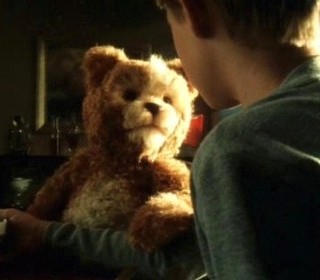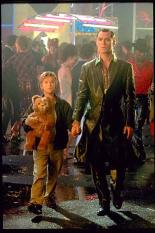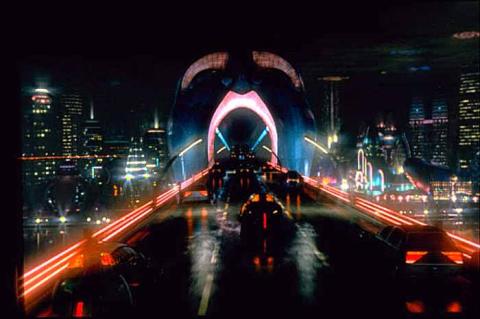This movie sucked like nothing has ever sucked before!










Gawdalmighty.
I rated Star Wars II: The Attack of the Clones four vacuums, but it was Citizen Kane compared to this abomination. This movie was the Gigantic Black Hole of Celluloid, sucking the talents of everyone involved into an abyss from which there is no escape. And in keeping with the laws of physics, time itself seemed to draw to a stop for the hapless viewer trapped in its clutches.
This was one of those rare movies that actually sucked before the opening credits. Staring at a black screen, we are held prisoner by an insipid lecture  on global warming that made Al Gore’s Inconvenient Truth feel like Rambo.
on global warming that made Al Gore’s Inconvenient Truth feel like Rambo.
Next we watch William Hurt (cast as “Professor Allen Hobby, The Visionary”) addressing a conclave of hostage library patrons, explaining the need for robot children, while elsewhere in the world a bereaved mommy (Mrs. Swinton) reads to her comatose child, humanely frozen in Sigourney Weaver’s cast-off hibernation pod from Alien.
Before you know it, her husband (one of Hurt’s employees), is dragging home the billion-dollar robo-brat prototype, cleverly disguised as Haley Joel Osment. Well, soon Mommy has forgotten all about her own kidsickle and has taken to “David” like a Democrat to a tax hike. Showing an inhuman lack of sensitivity, she reads Pinocchio to the tyke, presumably to reaffirm his self-identity as a soulless animatronic mechanoid.  Borrowing from such powerful drama as Buck Rogers in the 25th Century, Spielberg here introduces a small android companion for David, named “Teddy”–sort of a cross between Fozzy Bear and Chucky.
Borrowing from such powerful drama as Buck Rogers in the 25th Century, Spielberg here introduces a small android companion for David, named “Teddy”–sort of a cross between Fozzy Bear and Chucky.
Well, who woulda thought that after years in a coma, the Swintons’ own son would pick now to go into defrost cycle and show up back home? In no time at all, Mrs. Swinton lovingly takes her darling prototype for a drive and, in her maternal compassion, abandons David in the woods like a pregnant alley cat.
From there things go from bad to unfathomably horrible. For the viewer, I mean. Jude Law, licensed ElectroSex android “Gigolo Joe,” is on the run from the law for a murder that was actually committed by a one-armed  man. He befriends the cute, adorable, young David for reasons best left unsaid. The full moon rises, but actually is a hot air balloon, and a bunch of extras from The Running Man show up on their Harleys, which are disguised as wolves. Our intrepid heroes are rounded up to be dismembered before a rabid stadium full of Human Supremacists. The faithful Teddy wobbles into camp, where he is captured and–in a brilliant, single-cut sequence reminiscent of Orson Welles’s Touch of Evil, spanning a full minute or more of screen time, thousands of extras, and about a million dollars’ worth of production–is dropped off at lost-and-found, from which he gets up and walks away.
man. He befriends the cute, adorable, young David for reasons best left unsaid. The full moon rises, but actually is a hot air balloon, and a bunch of extras from The Running Man show up on their Harleys, which are disguised as wolves. Our intrepid heroes are rounded up to be dismembered before a rabid stadium full of Human Supremacists. The faithful Teddy wobbles into camp, where he is captured and–in a brilliant, single-cut sequence reminiscent of Orson Welles’s Touch of Evil, spanning a full minute or more of screen time, thousands of extras, and about a million dollars’ worth of production–is dropped off at lost-and-found, from which he gets up and walks away.
Unfortunately, David and Gigolo Joe escape destruction. David, using his positronic  brain, deduces that if only he can find the Blue Fairy, he can become a real boy. The two make their way to Rouge City, a sort of Las Vegas without the understated charm, where they are pointed to Manhattan by a holographic Einstein (which should engender some kind of lawsuit from his descendants).
brain, deduces that if only he can find the Blue Fairy, he can become a real boy. The two make their way to Rouge City, a sort of Las Vegas without the understated charm, where they are pointed to Manhattan by a holographic Einstein (which should engender some kind of lawsuit from his descendants).
David goes to the destroyed, underwater metropolis and runs into, who else, Professor Hobby. Drawing from page fifteen of the Plot Convenience Handbook, the prof leaves David alone while he looks for some associates (who, perhaps due to budgetary limits, are offscreen). David then escapes and ends up underwater, trapped in front of the Coney Island Pinocchio ride, where he will stare at the Blue Fairy for all eternity. Well, it’s better than watching this DVD.
My wife dozed off at this point; when she awoke five minutes later and asked what she had missed, I told her, “Well, the global warming froze all the oceans, thousand of years elapsed, and some kind of scrawny aliens, or possibly androids, have taken over the world and are debriefing David.”
She thought I was kidding.
Spielberg now wrote an entire new chapter in the Plot Convenience Handbook by having the aliens explain to David that everything, including memories, are trapped in the fabric of space-time and that by using a sample of DNA they can reconstruct his full-grown mother, and he and she can be reunited. Well, only until she falls asleep, that is, at which point the space-time fabric forgets everything. (Don’t ask me; I didn’t write it.)
 So they bring her back, she hugs and lovie-cuddles David, reads him a bedtime story, and falls asleep, leaving David dead, comatose, or alone for all eternity–the movie wasn’t terribly clear on which.
So they bring her back, she hugs and lovie-cuddles David, reads him a bedtime story, and falls asleep, leaving David dead, comatose, or alone for all eternity–the movie wasn’t terribly clear on which. 
The film ended after a scant six or seven weeks, although the running time is officially listed at two hours twenty-six minutes.
I thought Haley Joel Osment was especially effective as the robot child yearning to be a real boy, perhaps drawing on his personal experience of feeling like a real actor trapped in the body of this film.
I rate it the entire Hoover production factory, but only because I’m in a good mood.
All Rights Reserved